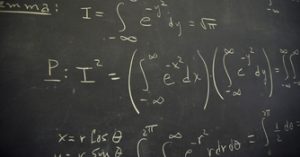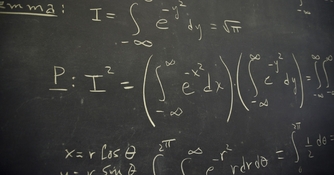While many departments across campus get lots of coverage and front-page exhibitions, the Department of Mathematical Sciences continuously works to achieve quiet excellence. In an interview with Dr. Naima Shifa, Dr. Suman Balasubramanian, Dr. Mamunur Rashid, Dr. Zhixin Wu, Dr. McKenzie Lamb, Dr. Sirous Homayouni and Dr. Scott Hiatt, the DePauw mathematics department discussed their current offerings, future changes, and reasons for undecided students at DePauw to consider a mathematics focus.
Many math professors are busy with their academic lives, focusing on topics ranging from machine learning, data representation, public health, operations research, graph theory

, and quantum theory to more diverse topics like actuarial science, financial math, risk management, and business. Not only is this department diverse within its areas of expertise, but it is an active participant in research at DePauw. Dr. Shifa is currently conducting research on the Hazara community in Pakistan regarding human rights issues. Dr. Wu is conducting research on risk management and indexed universal life within the insurance sector. Other professors have varying topics of interest involved in their personal research and were very open to discussing opportunities with students at DePauw. Outside of their classes at DePauw, the possibilities of multifaceted research are endless.
This department has gone through numerous changes over the years, but the most significant ones are yet to come. As the department recognizes the constant evolution of students and industries, the department is looking forward to continuing a rich history of diverse classes, majors and applications. A few years back, a Data Sciences minor was added to their strong catalog of majors in mathematics and actuarial science and minors in applied statistics and Mathematics. Dr. Wu highlighted the diversity of her courses as these intersect with many business majors, Management Fellows, and even classes included in the Business School. Students in the math department are often enrolled in classes with other majors and interests across campus including physics, chemistry, global health, economics/finance/business analytics, and computer science.
While a title from DePauw is an achievement many should be proud of, many students wonder what their degree can do for them. The professors were not short on examples and industries that could be applicable within the next few years after DePauw. Actuarial students find employment in the fields of insurance, risk management, consulting, banking, investment, etc. Many math students can cite clear applications like engineering or graduate school degrees in mathematics or data analysis, but most cannot see the application to law or even working for the NSA. The professors cited countless examples of industries, professions, and even companies that their own students have entered. Columbia University and Washington University in St. Louis even have programs designed for math majors to enter graduate school. Some paths that their own students or colleagues have taken include optimization, financial math, and mediation. Dr. Wu has even seen her students enter law school after DePauw.
A math degree might get you into an industry. But many students wonder, "why should I give mathematics a second look?"
Diversity. This was the resounding answer countless professors gave me. Not only in the classes offered within the majors but also within the applications and knowledge gained. “What are you going to do with your first paycheck?” Dr. Balasubramanian said. She highlighted how these practical skills are taught during class to allow students to lead a successful and knowledgeable life. The whys and hows of life can be answered through math. It is all in the numbers, they said.
Finally, the age-old question: was math invented or discovered? This question was presented to the brightest mathematical minds the university has to offer, but it did not last long. After a moment of thought, Dr. Lamb responded, "invented." He cited the difference in thought between a Calculus 2 class and a physics class regarding the topic of convergence of a series. While one mind might explain it a certain way, others can see the same problem differently. Dr. Shifa and Dr. Wu followed suit, describing how public health or human rights utilizes math to analyze real-world concepts as certain methods are ongoing. Even the insurance sector shows that math courses can use various processes to convey insurance or mortgage methods.
This department is welcoming, intelligent, and driven, convincing me that students with undecided majors and even declared students looking for a Q credit should consider taking a class with the math department. The myriad of available applications and topics should put many students at ease, especially those who see a wall behind this notoriously hard major. For more information about the Department of Mathematical Sciences, please visit the department webpage.



